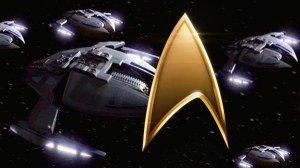Gene Roddenberry’s Star Trek: The Original Series ran for only three seasons from 1966 to 1969, but it launched a decades-long franchise and changed science fiction forever. Introducing a blend of optimism, diversity, and real-world commentary via space adventures, TOS set the stage for every Star Trek title that followed. Iconic imagery like Captain Kirk’s gold tunic, Spock’s eyebrows, and the Vulcan salute are forever embedded in the cultural lexicon. Even its mid-century modern aesthetic has survived in the still-thriving franchise.
Videos by ComicBook.com
However, some TOS episodes are better than others, with some leaning into action, others focusing on philosophy or tragedy, and a few that got famously weird. The best episodes consistently struck a balance between strong character development, sharp writing, and memorable moments that fans still think about decades later. Here are the 10 best episodes of Star Trek: The Original Series.
10) “Space Seed”
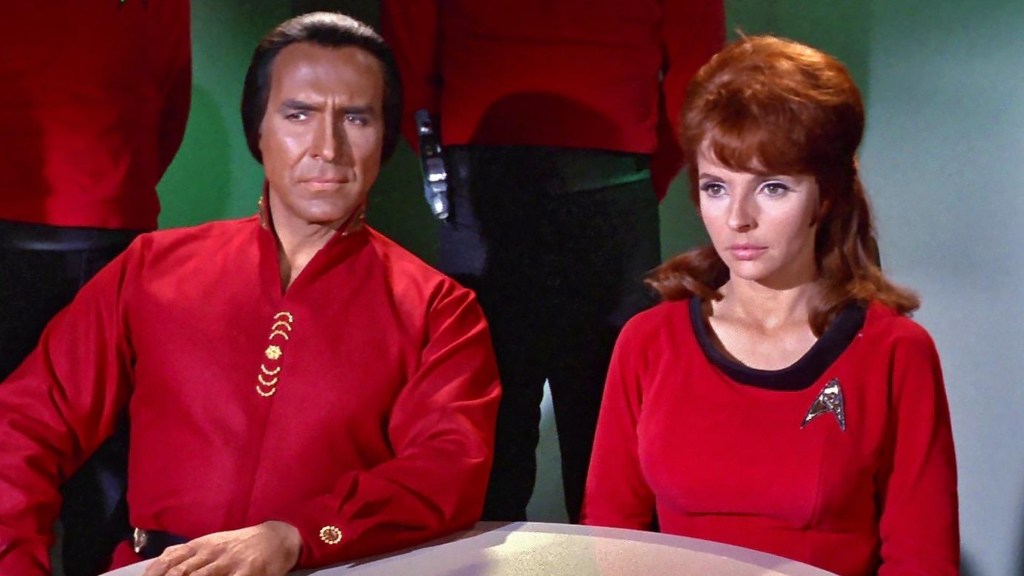
First aired late in Season 1, “Space Seed” introduces Khan Noonien Singh, a genetically engineered tyrant from Earth’s past, who is found in stasis and quickly tries to take over the Enterprise. Ricardo Montalbán’s Khan is raw, charismatic, and dangerous, and the chemistry between Khan, Kirk (William Shatner), and Lt. Marla McGivers (Madlyn Rhue) is excellent across the board.
This episode, written by Gene L. Coon and Carey Wilber and directed by Marc Daniels, has aged remarkably well due to the enduring relevance of its themes. Khan is intelligent, persuasive, ruthless, and the exact kind of leader who seduces people into giving up freedom for strength. Even if Wrath of Khan never existed, this episode would still stand on its own. That it launched Trek’s best movie villain is just the icing on the cake.
9) “Mirror, Mirror”
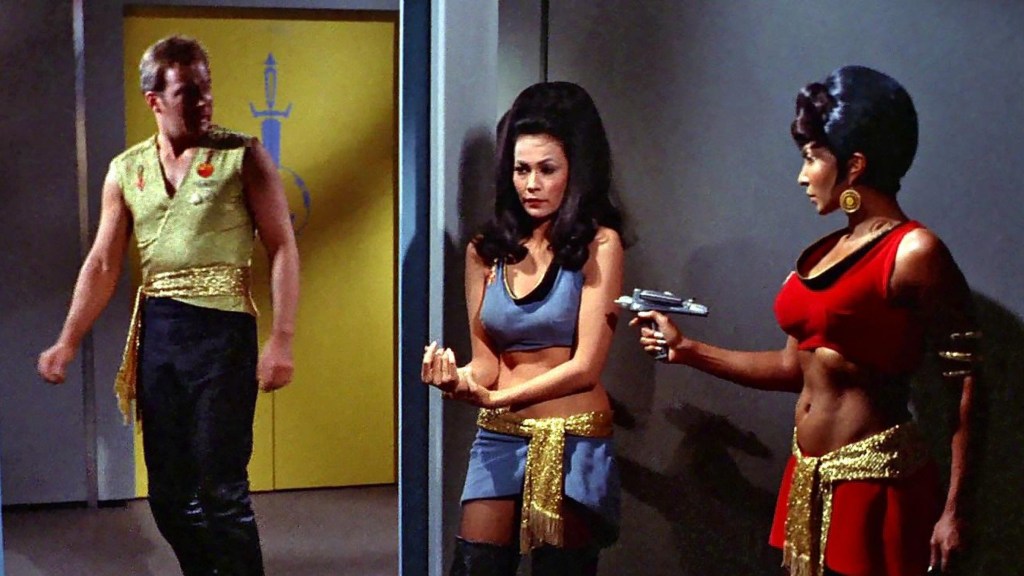
Written by Jerome Bixby and directed by Daniels, Season 2’s “Mirror, Mirror” follows Kirk, Uhura (Nichelle Nichols), Scotty (James Doohan), and McCoy (DeForest Kelley) as they’re accidentally transported to a parallel universe where Starfleet is a brutal empire. The evil versions of their crewmates are violent and power-hungry, and Leonard Nimoy’s Spock wears a goatee.
Beyond the extremely fun concept, the story explores how ideology shapes behavior. Even though it’s an alternate universe, the characters feel wonderfully grounded in the sharp performances. The episode introduced the concept of the Mirror Universe, which would later appear in multiple Trek shows, but the original remains the most effective… and the most entertaining.
8) “The Corbomite Maneuver”
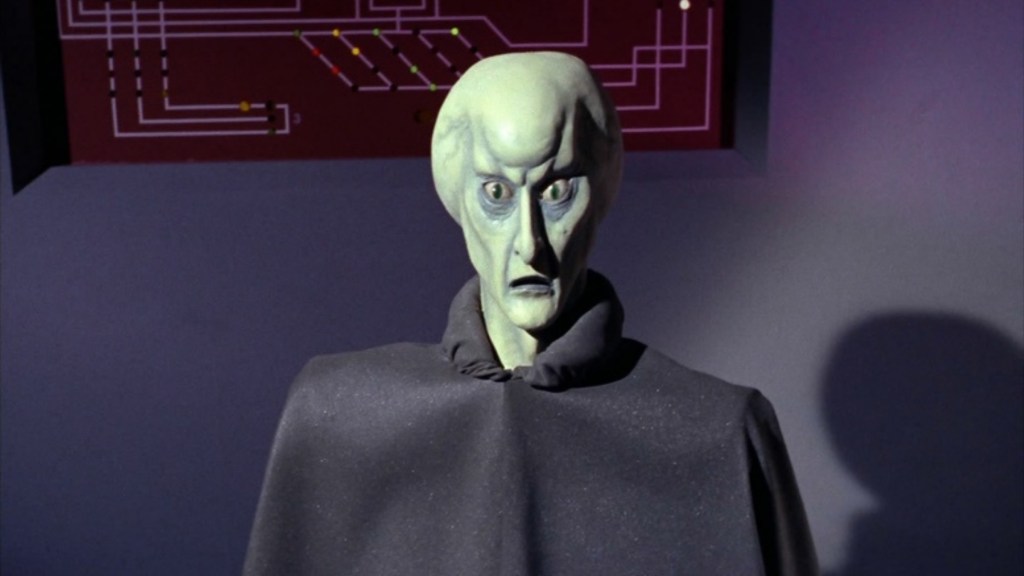
Another Season 1 episode stands as one of the first true tests of Kirk’s leadership. When the Enterprise is threatened by a massive alien ship, Kirk bluffs that their vessel contains “corbomite,” a substance that will destroy any attacker. The episode, written by Jerry Sohl, builds tension slowly, almost in real-time, highlighting the characters’ palpable nerves and the fraught decision-making process that became a signature of the franchise.
What remains effective is how much it reveals about Federation values. Instead of meeting power with violence, Kirk uses logic and imagination to escape. It’s a quiet, cerebral hour of TV that sets the tone for everything Trek would become.
7) “The Doomsday Machine”
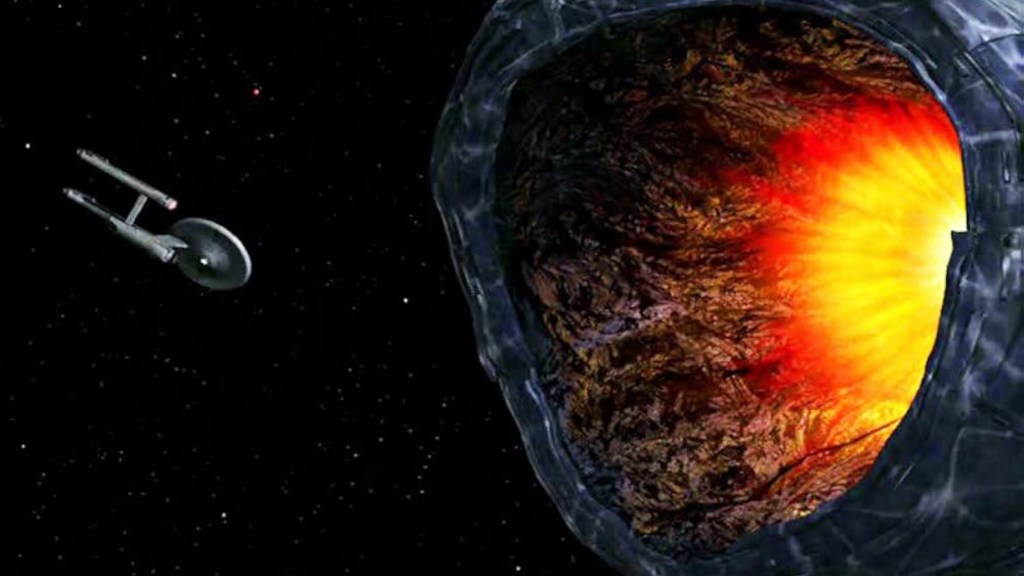
In contrast to #8, this episode from Season 2, written by science fiction author Norman Spinrad, is all action. A massive, automated planet-killer is tearing through the galaxy, and Kirk must stop it while simultaneously navigating a situation with Commodore Decker (William Windom), a fellow Starfleet officer shattered by grief.
The episode mixes space combat with psychological drama, and it’s widely heralded as one of the best, thanks to a strong script and a memorable guest performance by Windom. The themes of trauma, obsession, and self-sacrifice give it weight. It’s also one of the rare TOS episodes that feels like it could have been adapted into a blockbuster.
6) “Journey to Babel”
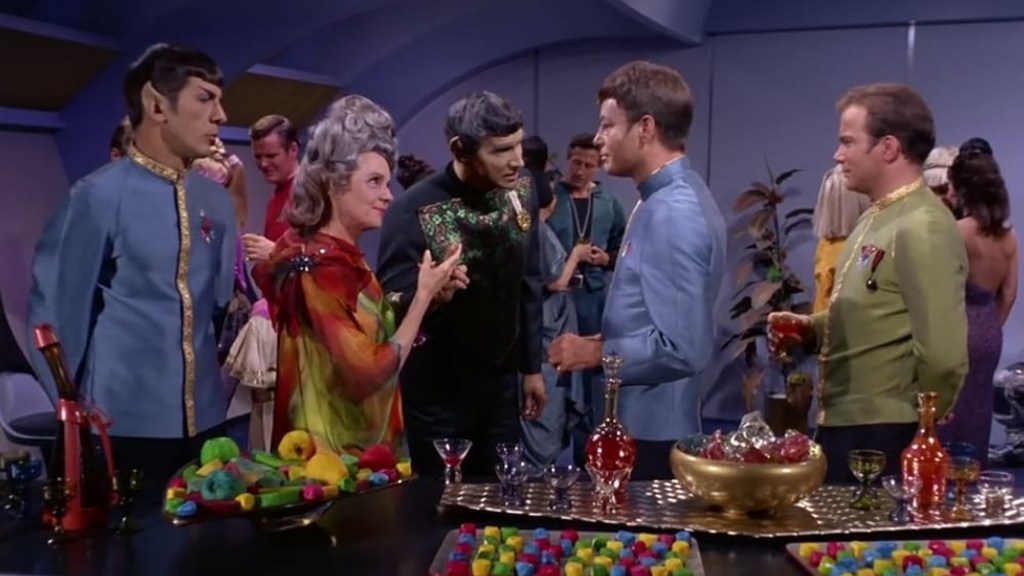
D.C. Fontana wrote this rich, character-driven episode, which sits smack in the middle of Season 2. In “Journey to Babel,” the Enterprise is hosting a diplomatic mission when things spiral into sabotage, murder, and political intrigue. It also introduces Spock’s parents, Sarek and Amanda, played by Mark Lenard and Jane Wyatt, and puts Spock in a position where he must choose between his duty and saving his father’s life.
What’s so great about the episode is how much it deepens the show’s universe without losing its pacing. You get worldbuilding, emotion, backstory, and action in equal measure. The family dynamics still resonate today, and they helped widen our understanding of one of the Franchise’s most beloved characters.
5) “Amok Time”
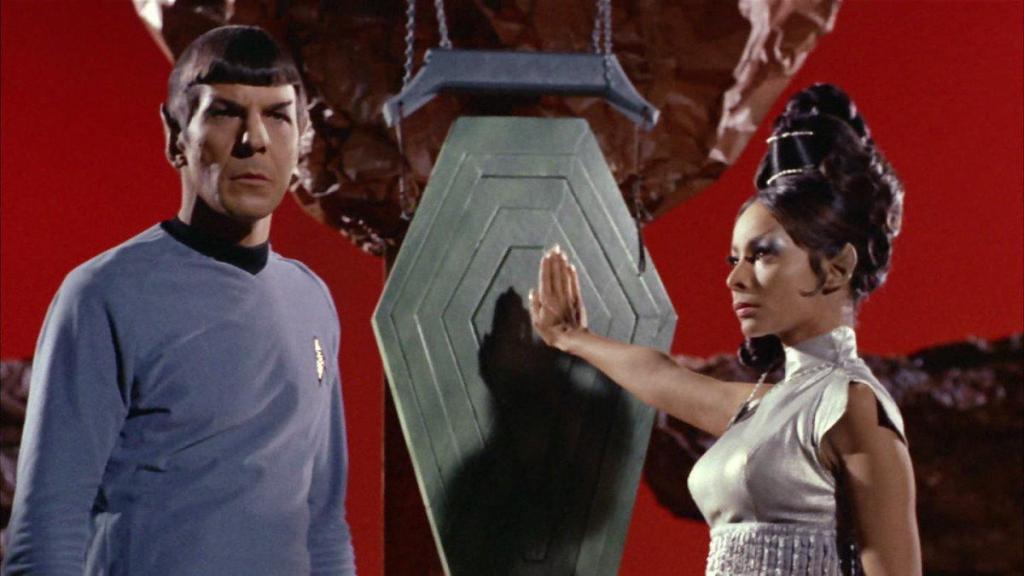
Season 2 kicked off with another landmark Spock episode, written by acclaimed sci-fi author Theodore Sturgeon. The episode starts with Spock acting erratically, then he asks to return to Vulcan, where he must face a ritual mating ceremony… or die. Kirk gets dragged into it and ends up fighting his best friend to the death.
This was the first time Trek explored Vulcan culture with any real confidence. The story is dramatic, strange, and somehow both a little funny and downright gut-wrenching. The fight music became iconic, and the emotional payoff — the moment when Spock realizes Kirk is alive — is still one of the most genuine moments in the series.
4) “Balance of Terror”
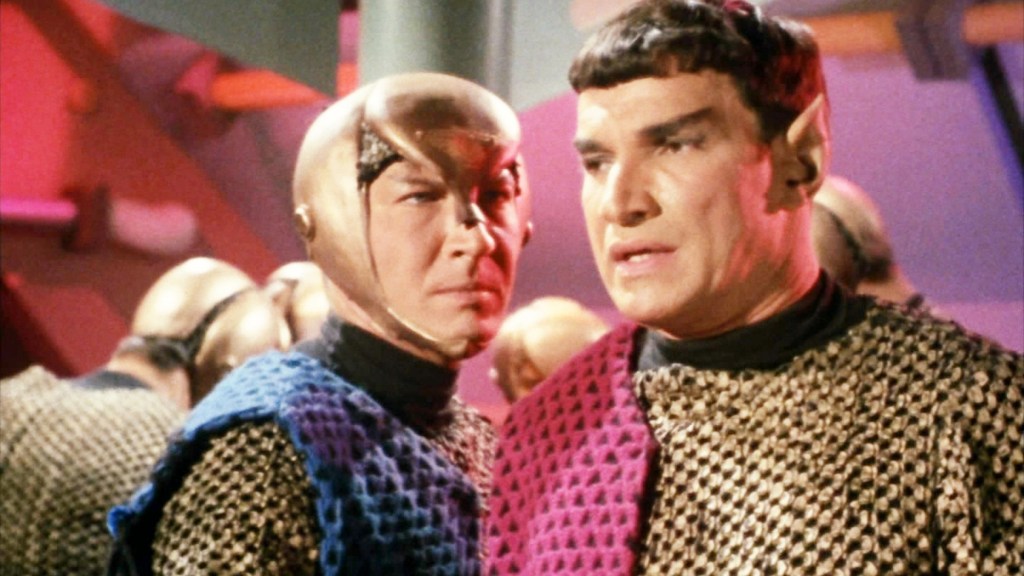
Written by Paul Schneider for Season 1, “Balance of Terror” plays like a submarine movie in space. The Enterprise must track a cloaked Romulan ship that has been testing the boundaries of the Neutral Zone. As Kirk and the Romulan commander (Lenard) engage in a cat-and-mouse game, tensions rise, and so does bigotry among the crew, as some distrust Spock simply for looking Romulan.
This episode is strong for two reasons: one, it showcases some of the show’s best tactical thinking. Kirk is still a bold explorer here, but he’s also a wartime commander, weighing lives with every move and forced into a pressure cooker of impossible decision-making. Two, the episode’s poignant social commentary on discrimination and prejudice remains as resonant as ever. The writing is tight, the drama is grounded, and the Romulans are instantly compelling villains. “Balance of Terror” is one that appears on the all-time favorites list of most Trekkies.
3) “The Menagerie, Parts I & II”
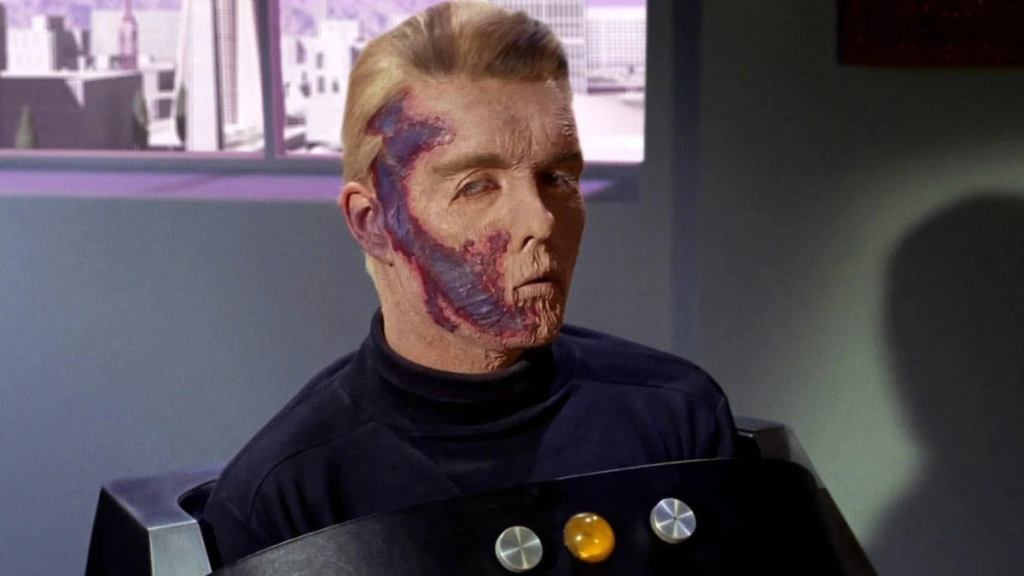
Sure, we’re cheating a little bit here, but Roddenberry cleverly repurposed the unused pilot (“The Cage”) in this two-part Season 1 story, which he also wrote. The mini-saga follows Spock as he risks everything to bring his former captain, Christopher Pike (Jeffrey Hunter in archival footage, Sean Kenney as the disabled Pike), to the forbidden planet Talos IV, where Pike can live in peace under the care of the telepathic Talosians.
Spock’s loyalty and the way the story explores the line between duty and compassion make this episode extremely compelling, and earn it a spot in the top three. We also get a rare early glimpse of Starfleet’s legal proceedings, along with fantastic emotional payoffs that reframe Spock as a deeply principled figure. It’s one of the boldest narrative experiments in TOS, and it sticks the landing as one of the best in the series.
2) “The Devil in the Dark”
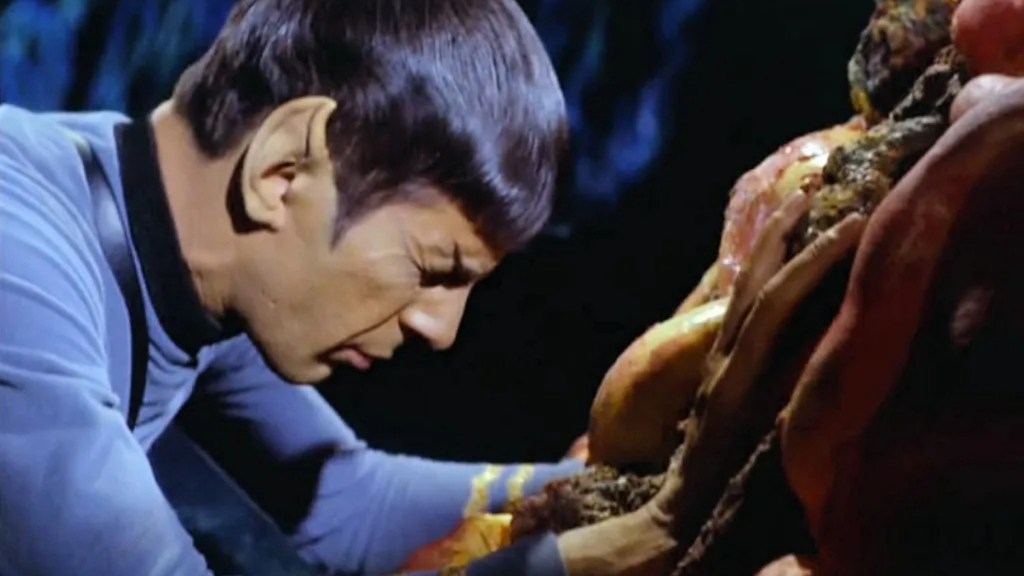
This standout from late Season 1 features Miners being killed by what they believe is a deadly, brute monster. However, Spock discovers that the creature, the Horta, is an intelligent being that is trying to protect its eggs. His mind-meld with the beast reveals its inner complexity, sentience, and pain, changing the crew’s entire understanding of the conflict and posing one of TOS’s most powerful moral dilemmas.
The rubber-suit creature might feel a little dated to a modern audience, but the message couldn’t be more timeless. It’s an episode about empathy, misunderstanding, and how fear often drives violence. “The Devil in the Dark” encapsulates the kind of morally aware future Roddenberry was pointing optimistically towards. The writing by Coon and performances from Nimoy and Ken Lynch as Chief Engineer Vanderberg brilliantly subvert the tropes of a classic monster story, turning it into a plea for compassion, and making it one of the most memorable and meaningful episodes of the series.
1) “The City on the Edge of Forever”
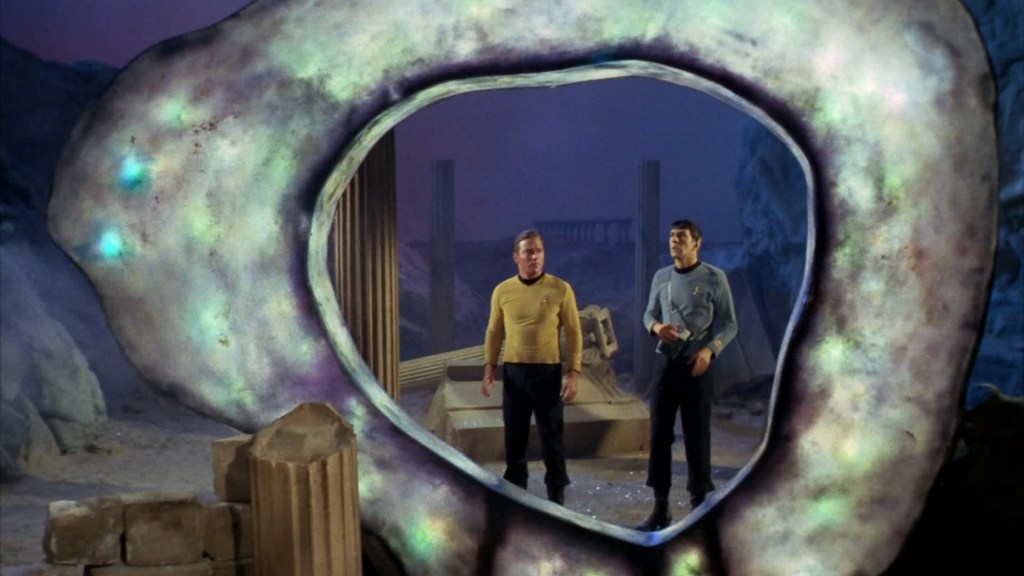
Written by Harlan Ellison (and heavily rewritten by staff writers), this Season 1 finale is often considered a masterpiece, and the best Star Trek episode ever made, even beyond TOS. After a time-travel accident, Kirk and Spock end up in 1930s New York. There, Kirk falls in love with Joan Collins’ Edith Keeler, a woman whose survival would lead to a Nazi victory in World War II. Posing the ultimate ethical dilemma: in order to restore history, he must let her die.
The moral and emotional stakes are devastating. It’s at once a love story, a time-travel paradox, and a meditation on personal sacrifice and the greater good. Shatner’s performance is one of his best, and the episode’s final moments are still haunting. “The City on the Edge of Forever” isn’t just a great Star Trek story—it’s perhaps one of the best hours of science fiction ever aired on television.
The remastered Star Trek: The Original Series is streaming on Paramount+. What’s your personal pick for the best TOS episode? Leave us a comment!


